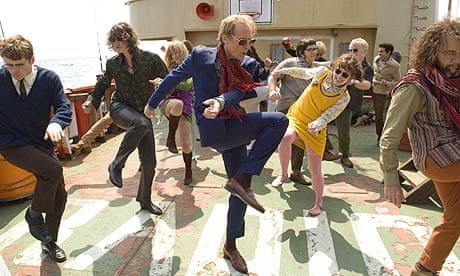The new film from Richard Curtis is a fond tribute to the heroes of his childhood: the 1960s radio pirates who exploited a legal loophole to broadcast rockandpoptastic sounds from a leaky boat in the North Sea while the BBC's stuffy monopolists were still cranking out Mantovani and Jess Conrad. The movie is boisterous, sentimental and worryingly deficient in laughs for a worryingly large amount of the time.
And the attitude to women? Well, I guess it could be a pastiche of that era's seedy chauvinism. One shot alludes to the raunchy album cover for Hendrix's Electric Ladyland. But there are nonetheless some softcore-topless depictions of comely young women that seem specifically intended to encourage the home secretary's husband to show up for the first matinee.
Bill Nighy plays Quentin, the elegantly louche proprietor of the good ship Radio Rock: a dandyish mantis of a man who begins the story by welcoming his godson Carl (Tom Sturridge) on board. The poor lad - whose anonymous, caddish father evidently got his mum pregnant and scarpered - has been expelled from school for smoking the laughably weak pre-skunk dope of those times. So Quentin is giving the lad some sort of vague job as a favour to his mother, for whom he appears to have a tendresse. Young Carl is jovially welcomed into this all-male world by the DJs under Quentin's command, who include a raunchy Emperor Rosko-type American, the Count, played by Philip Seymour Hoffman; the libidinous Dr Dave (Nick Frost); supercool Gavin (Rhys Ifans); uptight romanticist Simon (Chris O'Dowd); and the terminally uncool Angus, played by Rhys Darby. There is also the very out-of-it and radically bearded classic blues and proto-prog enthusiast Bob, played by Ralph Brown, and a comedy lesbian cook, played by Katherine Parkinson. The fascistic government forces who want to abolish Radio Rock are the thin-lipped minister, played by Kenneth Branagh, and his oleaginous underling (Jack Davenport), who is called Twatt, a name that is as funny on the page as it is on the screen.
It's a great cast, and the aggregate wattage of their collective screen presence maintains a certain level of watchability. But they are almost never given any honest-to-goodness funny lines, just warm-hearted, decaffeinated dialogue and opportunities to laugh uproariously with and not at each other - not responding to jokes as such, but affirming to themselves and to us what great guys they all are. Their professional record-playing activities are presented in montage and we are regularly shown vignettes of ordinary Brits adoringly gathered round their radios - nurses, schoolgirls and couples in parks.
Women are admitted on to the ship in the form of girlfriends and screaming fans, but they are all just a bunch of dolly-birds, and duplicitous dolly-birds, what's more; minxes who break the hearts of more than one of our dopey male heroes. I couldn't help but wonder that Curtis should have given us such a naff gallery of Britfilm babes, as if he is trying to emulate St Trinian's or Lesbian Vampire Killers. After all, his scripts have featured strong women in the past: Julia Roberts and Gina McKee in Notting Hill, Laura Linney in Love, Actually, Emma Thompson in Love, Actually and The Tall Guy. (Thompson has a cameo here as Carl's tippling mother.) Some of those films were more successful than others, but there was always a really smart woman in there who was intended to get laughs on her own account. Not here, though: they're Nuts mag centrefolds.
Weird things happen in the plot, too. There's the question of who Carl's true father is, a mystery that is perfunctorily raised and anti-climactically resolved. I wonder ... did Curtis flirt with a "Darth Vader" outcome to this plotline? More bafflingly, Branagh's nasty minister humiliates his underling Twatt by saying he's useless "just like his father". What? Twatt's father? At this point, I suspected that there would be a subplot where Twatt would thoughtfully go and visit Twatt Sr in his retirement home: a likable old cove into jazz and skiffle, perhaps, and so Twatt would leave the dark side and support the good guys. But no: Twatt's dad is never mentioned again, perhaps languishing in a deleted scene.
Richard Curtis has always been a class act: a powerhouse talent who turned his style of romcom into a global brand. In the line of professional duty, I am always tripping over films that are, in effect, ripping him off - in which category I am tempted to put Woody Allen's Match Point. Curtis has also created an institution in the form of the admirable Comic Relief, which is occasionally looked down on by pundits for whom charitable giving is not an instinctive priority.
The Boat That Rocked certainly has one or two funny moments: Rhys Darby gets some laughs as he daringly plays Seekers records back-to-back, and there is an engagingly oddball character called Thick Kevin (Tom Brooke). But please, Mr Curtis, enough with the warm-heartedness. We need some gags.





